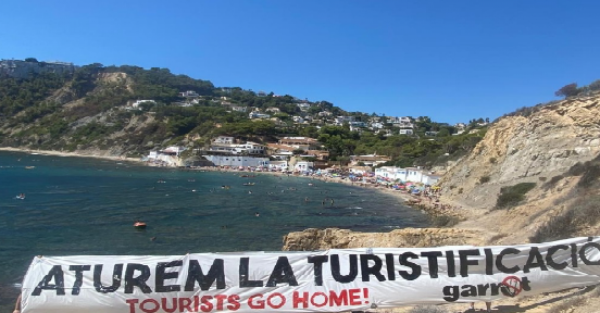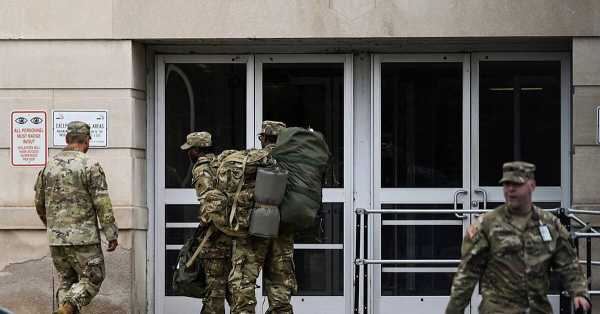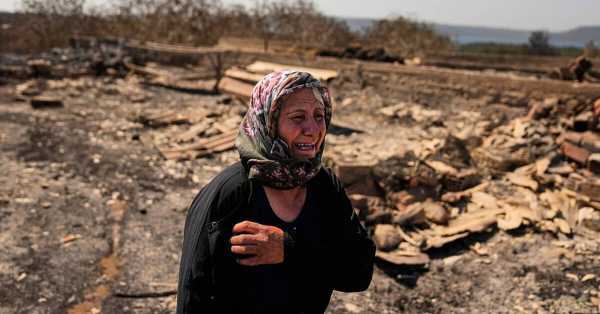
Protestors unfurled a huge banner telling tourists on a packed Costa Blanca beach on Sunday to “Go home”.
The activists let off pink flares to make sure holidaymakers relaxing on the sand or cooling off in the sea received the message.
They appeared to be directing themselves at English-speaking visitors with the language they used in bright-red capital letters, although they also used the local Valencian language to appeal to residents with a message above it on the banner which said: “Aturem La Turistificacio’ – ‘Stop Touristification.’
The beach protest was carried out by a group called Garrot and took place on Sunday at Barraca Cove, also known as Portixol Cove, near the Costa Blanca tourist hotspot of Javea close to Benidorm.
The banner was unfurled on rocks to the north of the cove where it was clearly visible to those in the sea and on the beach.
A spokeswoman for the protesters said afterwards: “We did it on Sunday because it’s market day and the main avenue is used as an arrival point by nearly all the tourists.”
It was organised by activists from the same group that held a huge anti-mass tourism demo in the Majorcan capital Palma last month, which halted traffic in Alcudia in the north of the island in a surprise and unannounced action.
Around 20 people from platform Menys Turisme, Mes Vida, which in English means ‘Less Tourism, More Life’ occupied the main avenue and held up banners, causing large traffic jams.
The group responsible was the same that organised a July 21st demonstration in Palma attended by an estimated 15,000 people, the second large anti-mass tourism protest in the Majorcan capital so far this year. That day demonstrators used Spain’s Euros final win to poke fun at English tourists as they branded British holidaymakers “drunks.”
The banners they were carrying included one which said in a gloating play on words over a picture of Kyle Walker: “The only thing coming home is you” followed by the 2-1 scoreline printed between England and Spain flags.
The twin actions came two days after residents of a Menorcan village dubbed the ‘Spanish Mykonos’ rejected a feared tourist ban, although one in three of the 195 homeowners favoured a prohibition 24/7.
The holidaymaker veto was said to be on the cards ahead of the vote after locals chained off the 22 entrances to their community at night-time earlier this year.
Residents voted to put restrictions in place after visitors flocked back to Menorca following the end of the Covid pandemic.
Some selfie-hunting holidaymakers ended up trampling through private properties in tourist attraction Benibeca Vell, a privately-owned community, although it is widely described as a village, and interrupting residents’ rest times.
Since May 1st visitors were only allowed to access its streets between 11am and 8pm and a tightening of restrictions had been talked about. In the end a modification of visiting times was agreed.
Confirming the result of the vote at an annual general meeting Oscar Monge, President of the Community of Property Owners in Binibeca Vell on Menorca’s southern coast, said late last Friday: “The result by unanimity is for a visiting timetable of 10am to 10pm with no entry charge.”
As well as certifying the tourist mecca would remain open during the daytime for the estimated 800,000 tourists a year who visit, Mr Monge’s announcement also put any possibility holidaymakers could be charged for touring Binibeca Vell on the back burner.
He added in comments early on Saturday: “The new visiting times will be brought in immediately.”
Although he described the vote as “unanimous” after the end of the meeting, he admitted later: “Around 30 per cent of the owners wanted to close permanently to tourists but the civic behaviour of visitors helped persuade people that the current partial closure is sufficient.”
The vote took place following a summer of discontent in the Balearic Islands which have seen thousands of people take to the streets in two major demos in the Majorcan capital Palma to protest at some of the problems caused by mass tourism including overcrowding and difficulties accessing affordable housing.
Other smaller protests have taken place in other parts of Majorca as well as Menorca, Ibiza and Formentera.
On July 27 around 250 protestors impeded tourist access to a picture-postcard Menorcan beach in a “surprise action”.
Activists boasted of filling a car park by Cala Turqueta, a beautiful cove on the island’s southern coast, with “residents’ cars”.
They then used towels and their own bodies to shape the message ‘SOS Menorca’ on the sand by the waterline.
The unannounced protest, by environmental non-profit organisation GOB Menorca, resulted in the car park being “blocked” to holidaymakers for around six hours from early morning according to local reports.
Anti mass-tourism protests have also taken place in the Canary Islands, where thousands took to the streets in co-ordinated April 20 demos across the Atlantic archipelago, as well as places like Alicante and Malaga.
Graffiti targeted at tourists has appeared in both Tenerife and Majorca.
Sourse: breakingnews.ie






